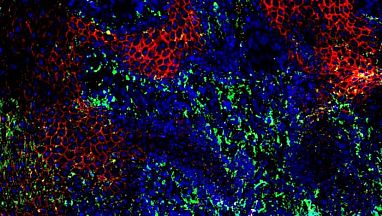
Exosomes – nanosized, fluid-filled sacs released from cells – play an important role in communication between cells as they can carry cargo such as proteins, peptides, and messenger RNA. In a new study featured in the October 2023 issue of Nano Today titled “Dysfunctional Exosomes Involved in Chronic Inflammation in Diabetic Wounds,” Chandan K. Sen, PhD (top), Director of the Pitt McGowan Institute for Regenerative Medicine, and Pitt McGowan faculty member Subhadip Ghatak, PhD (bottom) examine the role of exosomes in inflammation, a common problem in chronic diabetic wounds.
Drs. Sen and Ghatak focused on the exosomes produced by keratinocytes, a common type of skin cell vital for wound healing and maintaining the barrier function of skin. They developed a process to isolate keratinocyte-derived exosomes in wound fluid, which was based primarily on unique marker proteins. They found that this new method could distinguish exosomes that were released by keratinocytes from other exosomes with a high rate of accuracy.
Drs. Sen and Ghatak compared exosomes isolated from chronic wounds in 22 people with diabetes with those from wounds in 15 people without diabetes and found that these exosomes exhibited a substantial difference in the chronic wounds of people with and without diabetes.

Immunofluorescence image of the edge of a diabetic wound. Two proteins involved in the release of exosomes from keratinocytes are shown in red and green. Image courtesy of Subhadip Ghatak.
When testing the exosomes in laboratory experiments with macrophages, which is a type of immune cell needed for wound healing, a stark contrast was observed. The macrophages exposed to the keratinocyte exosomes from non-diabetic patients showed signs of the resolution of inflammation while those from people with diabetes stayed in a persistent inflammatory state.
“If incoming keratinocyte signals contained within exosomes are correct, the macrophage knows how to resolve inflammation in the wound,” Dr. Sen said. “In diabetes, crosstalk between keratinocytes and macrophages is compromised, so macrophages keep driving inflammation and the wound can’t heal.”
The researchers are planning future studies to determine if exosomes can be engineered to restore the ability to promote wound healing in people with diabetes.
Read more here.
